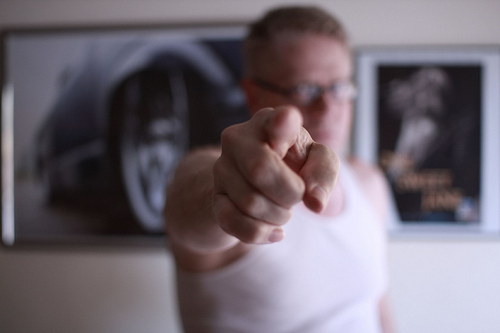Whenever we expect something—anything—of others, we set ourselves up for disappointment.
Most of us want to feel happy and since disappointment feels crappy, we’d serve ourselves and others by curbing this unappealing characteristic.
Even when we expect something from ourselves, sometimes there can be disappointment even though there’s at least some measure of control in the outcome of our actions.
My motto in life is: If it feels good, do it, and if it doesn’t, knock it off already!
This pertains to big picture feel good stuff, not Ha!-I-won-that-argument/got-my-way/proved-my-point-but-now-I have-no-friends stuff. With this kind of unkind attitude, which most of us display from time to time (me included) we are bound to be packing anger and negativity within us. And that’s just bad for us.
Usually, when we ‘should’ on others we have an expectation that they be like us. Not only do we think others should be/think/do like us, but we expect them to be the perfect versions of us. Talk about a set-up for failure!
We are all unique human beings, viewing life through our own tinted perceptions.
I have to catch myself on this one constantly, even when I’m judging others for judging others!
True story: Due to economic and family health reasons, my mom, sister, her husband, brother, his wife and a foster teenager are all moving in together (!). My siblings and mother have different spiritual beliefs far removed from one another.
Being a gypsy, and there being no extra shelf space to store me on, I escaped certain challenging lessons I may have learned by adding my body to this amassed mass of family!
In a conversation during a recent family dinner, we discussed the difference between unspoken expectations and verbalized boundaries and house rules per se.
The magnitude of open and loving communication and group and individual compromise is required for this loving living arrangement to work.
Privately, each family member told me their concerns. They are all the same: Will [whoever] behave the way I want—which is to say the way the person speaking would behave? (Or at least a close measure of that.)
I had to set aside my own expectations of how they should be in order to remain objective.
Any time we have a negative internal reaction, it’s not about the other person: it’s about us.
Even if we are directly attacked (verbally, physically or otherwise), our negative reaction is a mirror to something within ourselves, just as the other person’s is to them.
It really is true when we say: It’s not about you, it’s about me!
When we feel violated, out of control, taken advantage of, used, disrespected, misunderstood, misrepresented, ignored, or any other negative feeling it comes from a place of undesired vulnerability, ego and fear.
Even when someone does something that triggers us, it’s about us not them, which violates my feel good rule!
So why do we do this and how can we knock it off, already?
We do it because we’ve been brought up in a social culture that cultivates dissonance and disconnect despite all the social sites claiming to bring us closer together—essentially, it’s because we’re civilized humans with ego and we no longer technically need each other to survive.
But we do need each other. We are innately programmed for intimate connections with others.
So how do we convert self-imposed suffering into good vibrations?
- Awareness. As with anything, this is the first step. We can’t fix what we don’t acknowledge.
- Hit the Pause button. When we start to get revved up in a rotten way, stop as soon as #1 kicks in. It might be mid-sentence; it might be two days later.
- Think. Yes, this is the opposite of meditation in a way, though thought-free, spacious meditation may bring us the answers we seek. With peaceful contemplation we might figure out where this reaction came from within us.
- Practice compassion. We are trying to do our best. If we assume others are, too, it makes this one easier to swallow. We are not omnipotent beings and don’t know the suffering (perceptions) of others.
- Take responsibility. Regardless of if we think we’re right or wrong (which are subjective, anyway) there is always something we can do differently next time. Or now. We can also ask someone if they can or would do something differently next time. (But we must be okay with their answer!)
- Be grateful! Trust that there is something in the situation that will allow expansion of our personal/spiritual/emotional growth if we allow it.
- Bonus points if we apologize! Nothing kicks ego (and therefore negativity) to the curb more so than a heartfelt apology. (Well, love does but this is a form of love.) Sometimes it’s better to be happy (and kind) than right.
Note: Apologizing with conditions, exclusions and a lot of disclaimer fine print—I’m sorry but you should have X and then I wouldn’t have Y blah blah blah—doesn’t count!
We not only take happy points away from whomever we’re supposedly apologizing to, we lose happy points ourselves.
And that sucks.
Bonus: Shoulding on ourselves also creates negative feelings and shame or guilt. While sometimes guilt can help us make different decisions in the future, usually it mostly makes us feel shitty. A gentler, empowering word to use with ourselves instead is: could.
Example:
“I should meditate. I could meditate. I will meditate… Or, I could meditate but at this moment my son’s soccer game/ term paper/ grocery shopping/ whatever is more important and I’m okay with this.”
So whenever we feel icky, let’s swoop in, a la Sesame Street Letterman, and change our shoulds to coulds.
When we love ourselves we share love with others more easily and Practice Point #4 (compassion) flows more freely—and that just feels good!
Love is the answer!
Love elephant and want to go steady?
Sign up for our (curated) daily and weekly newsletters!
Editor: Renée Picard
Photo: Flickr







Read 6 comments and reply